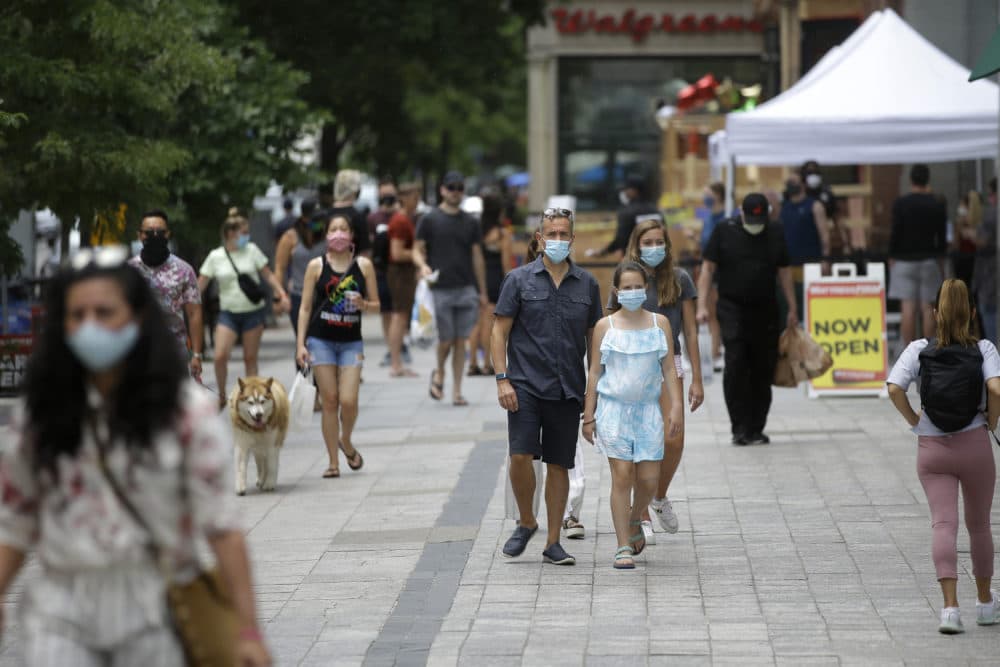Advertisement
Coronavirus Coverage
Experts Feared COVID-19 Would Surge Back In Mass. After Protests, Businesses Reopening. It Hasn't

En español, traducido por El Planeta Media.
When Massachusetts started phase one of its reopening plan, many health experts worried the state wasn’t ready. They were concerned about interactions between people without six feet and a plastic shield to protect them – in places like churches and hair salons.
Then thousands of residents rallied to protest racial injustice and police brutality after the police killing of George Floyd. Watching demonstrators packed shoulder to shoulder put health experts on edge once again.
“I absolutely was,” says Erin Bromage, an immunology and infectious disease researcher at UMass Dartmouth. “For me, there’s no doubt there was transmission at those events. The question was just going to be how much. I wanted them not to [protest] but understood they needed to, so that there can be change.”
But despite the protests, the resumption of dining in restaurants, and the slow resurrection of shopping and other activities, fears of a fresh spike in coronavirus cases so far haven’t materialized. Now, in the state’s seventh week of reopening, new cases of COVID-19 continue to drop, and the rate of positive tests hovers around 2%. On Tuesday, the state reported no deaths for the first time in many weeks. Results from free pop-up coronavirus testing sites for protesters also showed only about 2.5% tested positive for the coronavirus.
Health scientists believe Massachusetts residents largely have themselves to thank for that. Dr. Gabriela Andujar Vazquez, an infectious disease doctor and epidemiologist at Tufts Medical Center, says the continued decline in coronavirus cases is mainly due to faithful adherence to basic COVID-19 precautions like wearing a mask, maintaining a safe distance from others and hand-washing.
“I think it speaks to people being aware and careful every day about what they do when they go and visit public places,” she says. “It’s still early for us to know if there is going to be an increase in cases, but so far, [the future] seems promising.”
That may be part of the difference between Massachusetts and other states that are experiencing new waves of coronavirus infections. Erin Bromage says that Massachusetts also has some advantages that other states don’t – in particular, a high concentration of public health expertise.
“We have so many public health people and epidemiologists in Massachusetts. I have probably worked with five or six hundred businesses in helping them understand the risks and reopen safely,” Bromage says. “When you have access to that amount of knowledge locally, I think you can put good practices in place and look after the people working for you and coming into those businesses.”
Advertisement
Bromage says in webinars with business leaders, he gives guidance on things like how many people can safely be inside a building based on factors like the air filtration system, and how to minimize risk when employees and customers interact.
“I’m sure the whole epidemiology crew at Harvard, Boston University, Providence epidemiologists are all doing similar things, which is engaging in the community to give that knowledge,” he says.
When the rate of new coronavirus cases falls even further, public health experts are looking forward for more things coming back. For instance, Bromage says there might soon be a way to restart some outdoor events.
“If we’re talking about a rock concert with a mosh pit, then no,” he says. “If we’re talking about a concert in the park where you can put down a picnic blanket and maintain space, the risk is substantially lowered. I hope these types of events can start taking place when the data supports that, and I think we’re getting close to that point.”
Bromage says he’d want to see positive test rates fall well below 2% before allowing those types of outdoor gatherings on a regular basis. But even if the rate of transmission is very low, the coronavirus will still be in the community, says Nicholas Reich, a biostatistician at UMass Amherst. People will need to remain vigilant for the recovery to continue smoothly.
“Outbreaks in decline are like slow simmering fires, waiting for someone to toss on dry kindling,” he says. “The virus is waiting for us to let down our guard. If we were to go back to business as usual without any precautions, I don’t think we’d see a sharp spike in cases right away, but it would only be a matter of time before the fire would be raging again.”
This segment aired on July 1, 2020.
